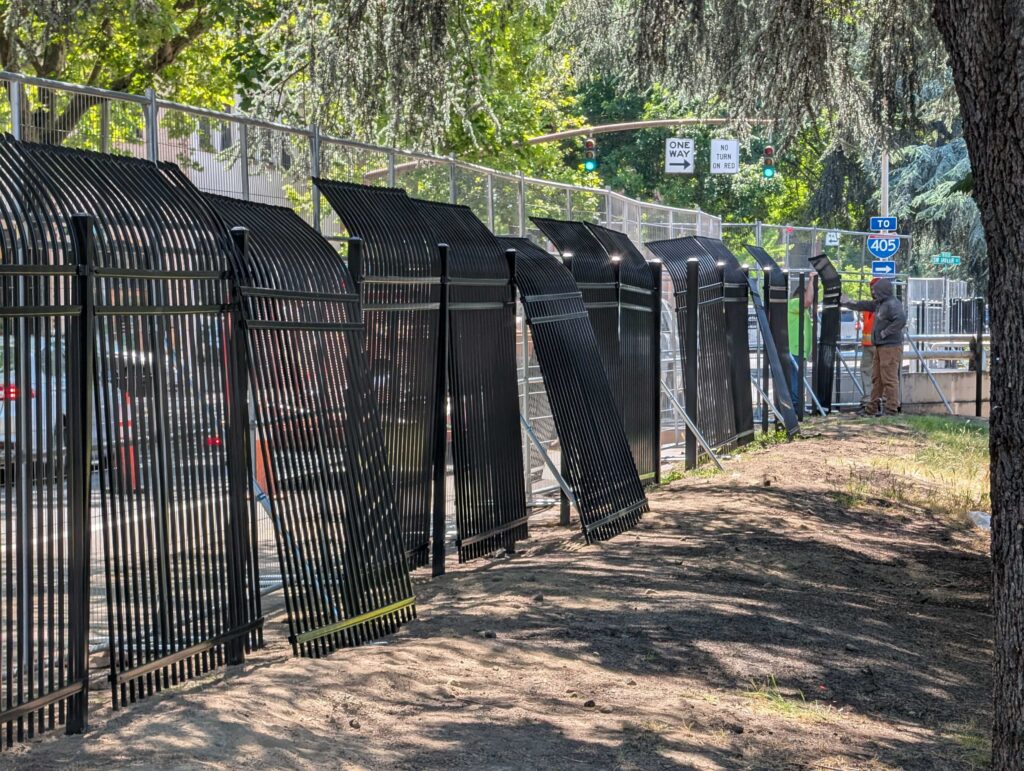The Oregon Department of Transportation is spending nearly $900,000 to erect permanent wrought iron fencing alongside Interstate 405 in Southwest Portland in an effort to prevent homeless camping near the freeway.
The transportation agency is collaborating with the city of Portland on the project with the state covering the construction costs and the city footing the bill for ongoing maintenance.
“We have been installing fencing along areas of urban state highways, including bridges and overpasses, for decades in Portland for safety,” said David House, a spokesperson for the state transportation agency, in an email. “We have also been installing fencing in Salem and Eugene. It is dangerous and illegal to camp on state highway right-of-way – it’s dangerous to walk in some locations close to highway traffic.”
The fencing along Southwest 13th Avenue from Main to Alder streets will cost the state about $457,000, according to Laura Rude, a spokesperson for Portland Solutions, the city department tasked with addressing homelessness and livability that is collaborating with the state agency on the project. Rude said fencing on Southwest 14th Avenue, tentatively planned to go from Jefferson to Alder streets and around a corner lot on West Burnside Street, will cost about $383,000.
The city is also paying about $64,000 to put up temporary fencing at the site due to supply chain issues that have delayed the permanent fencing, Rude said.
This is not the only “hardening” project – a term for the construction of barriers in an urban setting that make it more difficult to camp or live outside – the city is working on at this time, according to Rude. New fencing has also been recently observed along Southeast Powell Boulevard near 57th Avenue. Details about the cost and extent of that project were not immediately available.
The City of Portland has installed chain-link fencing, boulders and large concrete blocks in pullout areas along Powell Boulevard between Southeast 53rd and 57th avenues to deter camping, in recent months.
Mark Graves, The Oregonian/OregonLive
“Camping is the primary reason the fencing is needed,” Rude said in an email. “This area is directly above a high speed freeway and having people camping or otherwise using the space is dangerous.”
The work started May 13 with the installation of permanent fencing on Southwest 13th Avenue beginning last week. About six people were working on putting up the permanent fencing Friday. Rude said officials have yet to determine when the construction of the permanent fencing on Southwest 14th Avenue will begin, but they may install temporary fencing there soon.
City reports show about 22 structures and more than 250 needles were removed from the site before the construction of the permanent fencing began. Those same reports show that 18 people were seen staying at the site.
A number of campers at that location were young people who had been at the same site for a long time,
KGW
reported. They told KGW they see the camp removal as a “waste of funding.”
Rude said the city is not currently ramping up its efforts to install fencing or barriers at homeless camping sites across the city. In fact, she said budget shortfalls make it unclear whether the city will collaborate on similar projects moving forward.
“The decision to install fencing, boulders and barriers is a complex one that has many factors – cost, scope of the project, degree of need, and the viability of the existing space for effective hardening measures,” Rude said in an email.
Fencing along Powell Boulevard between Southeast 53rd and 57th avenues has been erected by the city of Portland to deter camping.
Mark Graves, The Oregonian/OregonLive
House said that the funding for fencing comes from an “already strained highway maintenance budget,” so the state agency must prioritize projects based on safety needs. The state spent $2.29 million on new fencing and $205,000 on fencing repairs in the Portland metro area during the biennium that ends this month, he said.
“Our goal is to maintain a safe, secure and effective (transportation) system for everyone, including pedestrians and bicyclists – and the unhoused,” House said. “We also respond to public concerns about camping along state highways, rights of way and other ODOT properties. Camping also can create environmental hazards such as bio-waste and trash, cause fires, distract road users, and interfere with ODOT’s ability to safely maintain the state highway system.”
Zaeem Shaikh contributed reporting to this story.
Lillian Mongeau Hughes covers homelessness and mental health for The Oregonian. Email her with tips or questions at
lmhughes@oregonian.com
. Or follow her on Bluesky
@lmonghughes.bsky.social
or X at
@lrmongeau
.
Other stories on homelessness
-
Bill to make civil commitment in Oregon easier moves forward
-
Portland mayor stands by improbable pledge to end unsheltered homelessness this year
-
4 overnight-only homeless shelters are set to open soon in these Portland neighborhoods
-
Key architect of Multnomah County homelessness programs says 2 things are missing from the system
-
Fentanyl use, drug deals cluster around a few Portland Plaid Pantry stores. Chain’s boss worries it’ll get worse





More Stories
New fencing to prevent homeless camping at 1 site in Portland will cost $900K
New fencing to prevent homeless camping at 1 site in Portland will cost $900K
New fencing to prevent homeless camping at 1 site in Portland will cost $900K